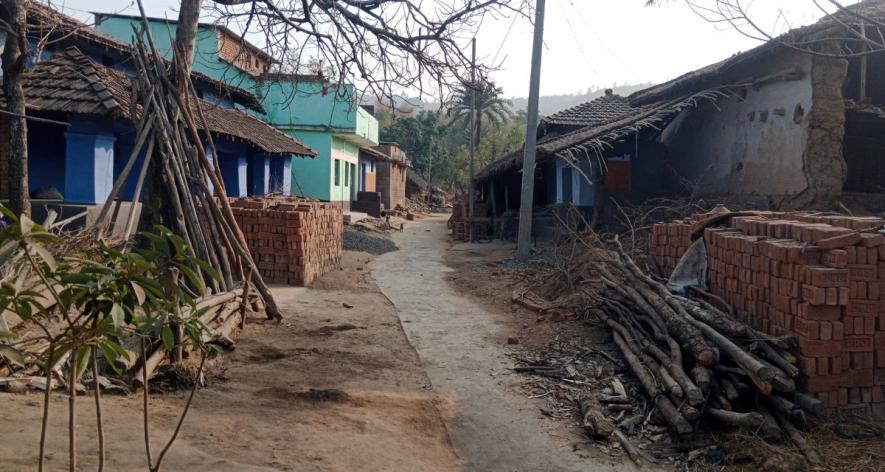Jharkhand: Coal Mine Blights Lives of Indigenous Residents - Part 1

Taljhari village, the site of violent clashes between protesting residents and security forces in January this year (Photo - Rahul Singh, 101Reporters)
Godda, Jharkhand: Stopping at the village entrance to take photos of a board announcing Taljhari's Scheduled Area status, this reporter is interrupted by a suspicious voice. "Who are you? What do you do?"
Martin Tudu, a resident of Taljhari, becomes a bit more comfortable as the conversation progresses, but doubts still seem to cross his mind at times. On being told about our intention to report on the coal project, he says, "My farm will also be acquired for the Rajmahal coal mine expansion. Pulses and other crops in my two bighas (0.5 hectares) of land were ruined during the police action against us."
Taljhari, in the Boarijor block of Godda district in north-eastern Jharkhand, is next to the Rajmahal Opencast Coal Project (OCP), a venture of Eastern Coalfields Limited (ECL). To ensure a sufficient supply of coal to two power generation units of NTPC Limited, ECL has been trying to expand its operations by acquiring 121.40 hectares from this village for the last few years.
However, opposition from the mostly indigenous residents in this part of eastern India has kept the plan on hold since 2018. During a demonstration in August 2022, some residents reportedly held ECL Chairman-cum-Managing Director (CMD) Ambika Prasad Panda and other officials hostage.
In January 2023, a violent clash was also reported in Taljhari. This reporter had visited the village a week after the incident when the villagers were particularly disinclined to speak. They were upset about what they mentioned as one-sided media coverage of the incident. It took a lot of persuasion to get them talking.
"ECL tried to acquire land in the Scheduled Area without obtaining permission from our gram sabha (village council). On January 16, we met MLA (member of the Jharkhand Legislative Assembly) Lobin Hembrom and demanded that the acquisition be stopped," says Manvel Hansda. According to him, no land in a Scheduled Area can be acquired by the government without concurrence from the village council.
Manvel says ECL officials came to demarcate the land on January 18, but the villagers did not allow them to do so. The next day, the officials returned with police reinforcements, and there was a violent clash with the residents.
Recalling the incident, Chandrashekhar Singh, in charge of the local police station in nearby Lalmatia, tells 101Reporters, "The administration is trying to get possession of the land that 22 families in Taljhari gave for coal mining in 2017, in lieu of compensation. Section 144 (which prohibits the assembly of over four people in one place) was imposed, but it was violated on January 18. Stones were pelted, and arrows were fired from the village the next day."
A resident who spoke on the condition of anonymity said in May, "Our village head Pulice Hansda is lodged in jail. He gets bail in one case and comes out but is put back in another."
Chandrashekhar says there was more than one criminal case, and bail was given only in one. Some other villagers are still in jail as well.
The sense of fear prevailing in the area is quite evident at the home of Marangmoy Tudu, the mukhiya (panchayat head) of Bhodaya panchayat, which has jurisdiction over Taljhari. Her relatives reject the idea of an interview straightaway. "How can she [the mukhiya] speak on this issue? Any discussion is going to affect our relations with many people. She will not speak."
Taljhari residents have written multiple letters opposing the mine expansion to the general manager of Rajmahal OCP and Godda deputy commissioner, the seniormost local bureaucrat. Copies are available with 101Reporters. They also met Jharkhand Governor CP Radhakrishnan when he was in the area on March 23 and submitted a memorandum.
According to Manvel, the villagers have sought an appointment with the President of India as well. "Taljhari houses 160 tribal families. The land is everything for us; it is the basis of our livelihood. If that too is taken away, we will be left with nothing," he says.
The Panchayats (Extension to Scheduled Areas) Act (PESA) is not in force in Jharkhand. "Taljhari mauza (a unit of land, usually the area of a village in revenue department records) falls in the Scheduled Area. How can they acquire land without gram sabha's approval? Even those who have been displaced by mining in nearby villages have not been properly rehabilitated," the area's elected representative to the Jharkhand Legislative Assembly (MLA), Lobin Hembrom, tells 101Reporters.
Police officer Chandrashekhar also says all the 22 families who handed over the land to ECL were ostracised. They now live in Mahagama, a town 14 km from Taljhari.
"We cannot even enter our village. People have cut all ties with us. They do not want to talk to us," bemoans Gulab Tudu (28) from one of the ostracised families. "We are yet to get a plot to build a house," complains another.
"There is all-round mistrust. Some villagers think I am about to sell my land to ECL, while the police stationed here after the clash will not allow me to enter my own plot. What will I do," asks Sanjhla Hansda, a resident of Taljhari.
Roska Murmu is more concerned about the water shortage in Taljhari. "Coal mining has been happening around our village for the last six to seven years. All our water sources have dried up in the last three to four years. We have no option but to fetch water from a place located half a kilometre away," he rues.
Anita Murmu, head of nearby Lohandia Bazar village panchayat, says, "Mining has affected 90% of the people in our panchayat. The water level has gone down, and pollution has gone up. Houses have been destroyed. When we send plans for work under the District Mineral Foundation Trust, only those from influential people are approved. Just think about this — of all the plans we put forth in 2022-23, only one was approved."
The Coal Conundrum
Rajmahal is the largest opencast coal project of the ECL, a subsidiary of state-owned Coal India Limited. There are two mines in the Rajmahal project area — Rajmahal and Hura-C.
Hura-C started production under the Mine Developer and Operator (MDO) model, wherein ECL will give mining work to a private firm through tenders. ECL pays the firm per tonne of coal mined.
Hura-C has the capacity to generate 238,000 tonnes of coal annually, according to ECL officials. Probably by 2024, two more mines — Simlon and Chuperbhita — with a 1.5 Million Tonne Per Annum (MTPA) capacity each, will start operations in the Rajmahal area under the MDO model.
Coal from Rajmahal OCP is supplied mainly to NTPC power generating stations in Farakka in West Bengal and Kahalgaon in Bihar. Together, the plants require 60,000 tonnes of coal per day, which means approximately 22 million tonnes (MT) annually.
In the 2022-23 fiscal year, Rajmahal OCP produced 5.6 MT of coal. An official speaking on the condition of anonymity says the mine will break even only if the production increases to 6.5 MT/year. "There is a loss of Rs 50 to 60 crore (USD 6.1-7.3 million) in the 2022-23 fiscal. The loss in 2021-22 was Rs 150 crore (USD 18.2 million)."
"To make Rajmahal OCP profitable, we need to acquire 33 hectares of additional land every year in the vicinity of the place being mined. This will help us run our operations smoothly," he explains.
Rajmahal OCP, which started operations in 1985, is equipped with modern machinery and has the capacity to extract 13 MT per year on its own. By employing three or four firms, it can mine up to the approved capacity of 20.93 MT per year.
It produced a maximum of 17 MT in 2017-18, but the non-availability of land has hampered higher production. As per an official document, Rajmahal OCP's revised capacity is 23.80 MT/year.
However, the protest in Taljhari has had a serious impact on the operational and financial position of ECL. In a letter to the shareholders in its annual report of 2021-22, ECL CMD Panda says production is likely to be lower by about 10 MT than the target every year due to the Taljhari issue.
"Since the production and supplies from Rajmahal area are less, the company has no choice but to make alternative arrangements to supply high-grade coal from Raniganj Coalfields [in West Bengal] to the power sector, which otherwise can fetch a much better price in the open market to alleviate the stressed financials of the company," he says in the letter.
Asked about the protests, ECL's Rajmahal project general manager Ramesh Chandra Mohapatra tells 101Reporters that people have been misguided. "Now they come to talk to us. Work to acquire land and undertake deep digging for mining is going on… You know how difficult it is to acquire land in Jharkhand."
According to a news report, ECL has managed to demarcate and acquire 17 acres (6.88 hectares) of land despite strong opposition. However, an official in Mohapatra's team informs that they have so far acquired 76 acres (30.76 hectares) in Taljhari but need 300 acres (121.41 hectares) more.
Rajmahal OCP is currently able to mine only about two-thirds of the area it plans to mine. "If we had possession of the land, we could have extracted 13 MT of coal. We have 1,987 hectares of notified land. We have to do mining on at least 1,400 hectares. However, we are able to operate in only 980 hectares," the official says.
101Reporters has filed an application under the Right To Information (RTI) Act for more details of the ECL plan. A response is awaited.
Jharkhand Colliery Mazdoor Union central secretary Mistry Marandi claims the coal company management does not work in a way that instils confidence in people. "If there are four or five siblings in the family, only one will get a job in exchange of land... There is mistrust among the villagers regarding their corporate social responsibility work as well."
(Rahul Singh is a Jharkhand-based freelance journalist and a member of 101 Reporters, a pan-India network of grassroots reporters)
Get the latest reports & analysis with people's perspective on Protests, movements & deep analytical videos, discussions of the current affairs in your Telegram app. Subscribe to NewsClick's Telegram channel & get Real-Time updates on stories, as they get published on our website.
























